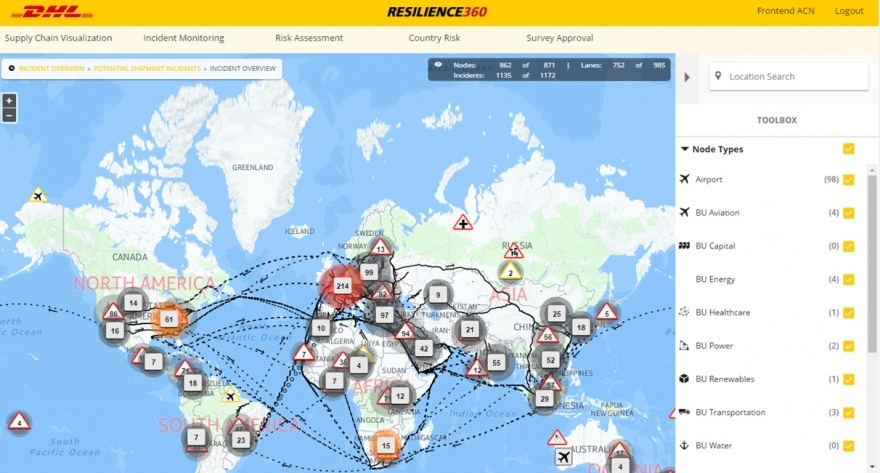Supply chain risk management: DHL introduces new Resilience360 module
Logistics - DHL has launched a cloud-based risk management platform and early warning system that streamlines and consolidates data from existing modules to provide further insights through DHL Resilience360.

September 22, 2017: DHL has launched a cloud-based risk management platform and early warning system that streamlines and consolidates data from existing modules to provide further insights through DHL Resilience360. Resilience360 Analytics is Group’s innovative tool, unique in combining systemically collected supply chain data with some of the most comprehensive risk databases available in the market.
It combines DHL’s Risk Exposure Index, a weighted index across more than 30 risk categories, with customer supply chain and business impact data to provide predictions of potential future obstacles. The analysed and consolidated data is visualised in a succinct manner and helps businesses have an increasingly clear view into their supply chains.
“As global businesses are growing rapidly while supply chains are becoming more complex, it is crucial for our customers to detect future obstacles along the supply chain and take early actions to mitigate business risks,” says Tobias Larsson, head of Resilience360, DHL Customer Solutions & Innovation.
During Hurricane Harvey, about 33 percent of US chemical production was disrupted, and many chemical suppliers had to give force majeure notices. Resilience360 Analytics showed that the expected shortages of basic industrial building blocks such as ethylene, chlorine or butadiene are likely to have an impact on the automotive, life science and healthcare and electronics industries. A manufacturing company in one of these sectors, for example, might have a supplier of chemicals that ships items by rail from the Port of Houston.
Armed with the knowledge that the port and the railway were likely to be closed for a certain period, the customer could be the first to pre-order additional supplies to cover that period. With the information from Resilience360, DHL is able to visualise their customer’s end-to-end supply chain, making it possible to specifically say whether production lines may be impacted and revert to contingency plans if needed.
The new module provides real-time insights to companies, helping them to gain a profound understanding of risks affecting their supply chain. The new module, for instance, shows that automotive and aerospace industries are 16.6 percent and 4 percent below the average risk profile, meaning that these industries are the most risk-averse, while chemicals and technology have a substantially higher risk profile with figures at 8 percent and 10 percent above the average respectively.
“Utilising the new analytical tool and methods now gives us the basis to develop regression and predictive models, further enhancing our solutions in the area of risk mitigation. Together with the Deutsche Post DHL Data Science teams, we are currently looking into alternative re-routing suggestions, shipment delay predictions, to forecast the likelihood and the potential duration of shipment disruptions for risk events along transportation hubs using millions of historic DHL shipment data sets,” says Rick Tillenburg, senior customer operations analyst, Resilience360.
From natural disasters to cyber-attacks and a quickly changing regulatory environment, organisations need to be prepared in order to take quick action when the inevitable occurs. The new R360 Analytics application complements DHL’s Resilience360 platform in order to map out specific industries and the subsequent impacts on other industries likely to run short of supply in the event of a disruption.


